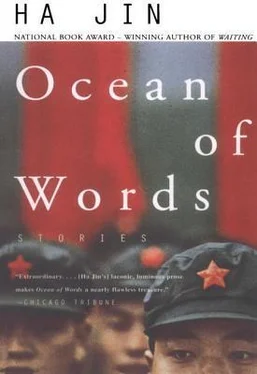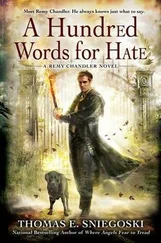Liu paused and looked rather vacant. “What should I talk about next, Little Si Ma?”
“Talk about the heroic deeds, like climbing the snow mountains and crossing the grass marshes.” Si Ma was amused; he glanced at Commander Pei, who was gazing at Old Liu. Apparently Pei liked the old man and the way he talked.
“Oh yeah, the snow mountains,” Liu resumed. “It was in the summer that year. We reached Baoshing, Szechwan Province, where the snow mountain is called Mount Jiajin. Nobody could see its peak, which disappeared in the clouds. When we set off, we didn’t know it was all covered with snow. It was pretty warm at the foot of the mountain. In the beginning we even cracked jokes on the way, but after an hour, things changed. It began to snow, and then cold winds were howling. We had on only summer clothes. Oh, everybody began trembling with cold and fear. You could hear ghosts and spirits screaming on the mountain and in the black sky. I lost my sandals. They were no use anyway, ’cause my feet had to tread through the snow. Some men started to pray. They believed the mountain’s spirits were angry at us. Then came a hailstorm. Oh heaven, those hailstones, as big as eggs, pounded us to the ground. One hit my forehead, and I was knocked down on my butt, my eyes filled with sparks and dark mists. Lots of men’s faces were smashed and covered with blood, and some knelt down, kowtowing to the mountain peak. It didn’t help. That was a spooky mountain; everybody believed so. In the end, we just buried our heads in the snow and let the hailstones strike our buttocks. The flesh is thicker there, more durable, you know. Ha-ha-ha!”
Some soldiers tittered. Si Ma turned around to stare at his men. Silence was restored.
“The grass marshes were no fun either,” Old Liu continued. “People got stuck in the mud — the more you struggled to get out, the deeper you sank into it. You couldn’t do a thing but watch your comrades sinking, and they disappeared right in front of you. I can’t stand to recall it, and my stomach will ache again. Their screams were horrible; I can still hear them. We ate everything in the marshes — our shoes, clothes, waistbands, anything that water can boil. Chairman Mao had his horse shot and gave the meat to some sick men. Let’s skip the marshes. I want to tell you something about the Tibetans. Any of you ever been to Tibet?”
“No,” a dozen men said.
“We went there before the marshes. All the villages were deserted. We had no food, so we cut their barley to eat. But we paid them, put the money at the edges of their fields and used small stones to hold it down. The Tibetans didn’t know that and thought we robbed them. They were barbarians and couldn’t understand we were the people’s army. So they deployed logs and rocks up on the hill waiting for us to pass the gorge in between. Once we entered it, they let everything roll down. My grandma! It was thundering on all sides, the logs rushing down on us, and the huge rocks smashing trees and anything in the way. We yelled and screamed and flung ourselves to the ground, and our horses jumped over our heads, running away. Every log finished off a dozen men; if you were not killed, you were scared half to death. I tell you, I couldn’t get up from the ground; my legs had cramps. I was lucky and crept under a disabled horse cart — that saved my life. Oh those Tartars, I can never forget how fierce they were!”
Some soldiers put their hands to their mouths. A few laughed out loud. Si Ma stood up, his face red and hairy, which at once reminded the soldiers of his nickname, Monkey’s Butt, so they couldn’t help laughing some more. He said to Liu, “Old leader, tell us something about the battles and victories.” He looked at Commander Pei, who gave him a meaningful smile and shook his round head.
“All right.” The old man’s eyes twinkled, and his sunken mouth jerked to the left. Taking a gulp of tea, he spoke again. “You’ve all heard of those victorious battles lots of times and must have calluses in your ears. Let me think of something else. Yes, here’s one. How can I forget it? After Liu-pan Mountain, we arrived in a small town called Chuzhi, and we were putting up our tents for the night. All of a sudden, the enemy’s cavalry came in the dark. We had walked for a whole day and had no strength left to fight. But the enemy and their horses were fresh; they’d been waiting for us for days. At once our troops burst out in every direction. We dashed around running for our lives. It was impossible to fight the enemy, and we had no horses and no time to deploy our men for a counterattack. I lost my head, just following those men in front of me. We jumped down a cliff that was not very deep. I lost my rifle there. Life was more important, so I didn’t stop to retrieve it. I lost my cap too. We were just running and running. Then I vaulted over a small haystack and landed in a pigsty. My face hit a slanting pole, and my nose was bleeding.”
Some men giggled. Secretary Si Ma stood up again. “Keep quiet and listen to the leader!” The giggling men lowered their heads and stopped.
Si Ma sat down. Do it to his mother! he cursed to himself. This old bugger talks like a counterrevolutionary.
“When I joined my company again,” Old Liu went on, “they asked me where my gun was. I pointed to my bruised face and said, ‘Look at my face.’
“But they said, ‘We don’t want to look at your face. We want to see your gun. Where is it?’
“ ‘Gone,’ I said, ‘my gun’s lost.’ Our company commander ordered me to go back and recover it. How could I do that by myself? The enemy was in the town now. So I went away. Damn it, I thought, if you don’t want your granddad in your unit, fine, I won’t stay, so I took off. I had no idea how to return home and just wandered to the east, where I was told there was a big city. But on the way I ran into a medical team of the Red Army. They asked me, ‘Little Comrade, why are you traveling alone?’ I told them I’d had trouble with my leaders and the company wouldn’t keep me anymore. ‘Can you take me with you?’ I asked.
“ ‘All right, you can come on our nursing staff,’ they told me, so I joined the Red Army again. This time I carried not a gun but a large chamber pot.”
The entire audience burst into laughter, but the old man didn’t even smile. He was gazing at the young faces calmly.
Secretary Si Ma got up again and waved to his men. He was sweating all over, and one of his molars was aching. “Comrades, be serious! We are in a lecture about the Party’s history now.” He turned to the old man, an awkward smile across his face, but he didn’t know what to say. He’d heard that even the divisional leaders couldn’t do anything about Old Liu when he got angry and swore at them, because none of them had joined the Red Army earlier than he had.
“But I didn’t stay on the medical team for long,” Liu resumed. “What happened was that the next summer, we wiped out two regiments of Chiang Kai-shek’s troops and captured hundreds of prisoners. Among them there was an officer who was totally reactionary. Whenever we treated his wounds, he’d curse us. He called us ‘Communist Bandits’ and ‘Red Beasts.’ Everybody was outraged.
“One night after duty, I went to the kitchen to fetch water. A group of the leaders were eating and drinking in there. They all got drunk. Seeing me come in, Mess Officer Wan Fumin stopped me and said, ‘Swig wine, Little Liu?’
“I took a gulp from his bowl. ‘Eat meat,’ he said, pointing to the plates on the table.
“ ‘What meat is this?’ I asked. We hadn’t had any meat for months, and at the word meat my mouth began watering. They all laughed. ‘Man meat,’ Feng Shun said. He was the leader of the Guards Platoon. I was shocked and couldn’t tell if he was serious.
Читать дальше











